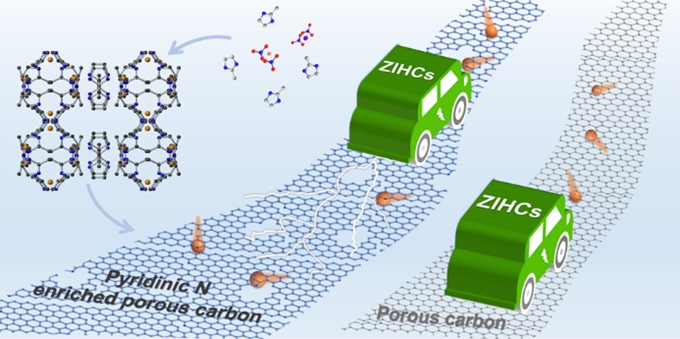Y. Li, P.F. Lu, P. Shang, L.S. Wu, X. Wang, Y.F. Dong*, R.H. He, Z.-S. Wu*
Journal of Energy Chemistry, 2021, 56, 404-411.
DOI: 10.1016/j.jechem.2020.08.005 [PDF]

Aqueous zinc ion hybrid capacitors (ZIHCs) hold great potential for large-scale energy storage applications owing to their high safety and low cost, but suffer from low capacity and energy density. Herein, pyridinic nitrogen enriched porous carbon (nPC) was successfully synthesized via the growth, subsequent annealing and acid etching of bimetal organic frameworks for high capacity and safe ZIHCs with exceptional rate capability. Benefiting from the mesopores for easy ion diffusion, high electrical conductivity enabled by in-situ grown carbon nanotubes matrix and residual metal Co nanoparticles for fast electron transfer, sufficient micropores and high N content (8.9 at%) with dominated pyridinic N (54%) for enhanced zinc ion storage, the resulting nPC cathodes for ZIHCs achieved high capacities of 302 and 137 mAh g−1at 1 and 18 A g−1, outperforming most reported carbon based cathodes. Theoretical results further disclosed that pyridinic N possessed larger binding energy of −4.99 eV to chemically coordinate with Zn2+than other N species. Moreover, quasi-solid-state ZIHCs with gelatin based gel electrolytes exhibited high energy density of 157.6 Wh kg−1at 0.69 kW kg−1, high safety and mechanical flexibility to withstand mechanical deformation and drilling. This strategy of developing pyridinic nitrogen enriched porous carbon will pave a new avenue to construct safe ZIHCs with high energy densities.